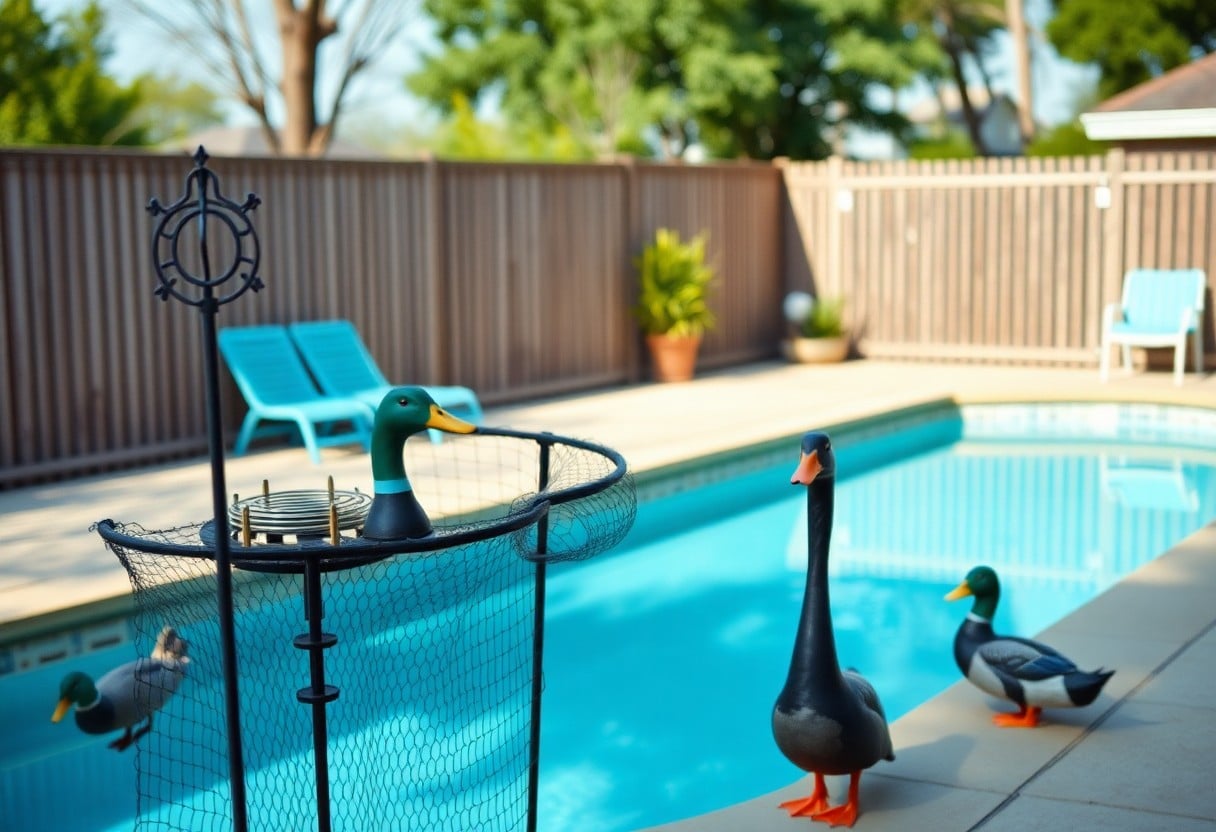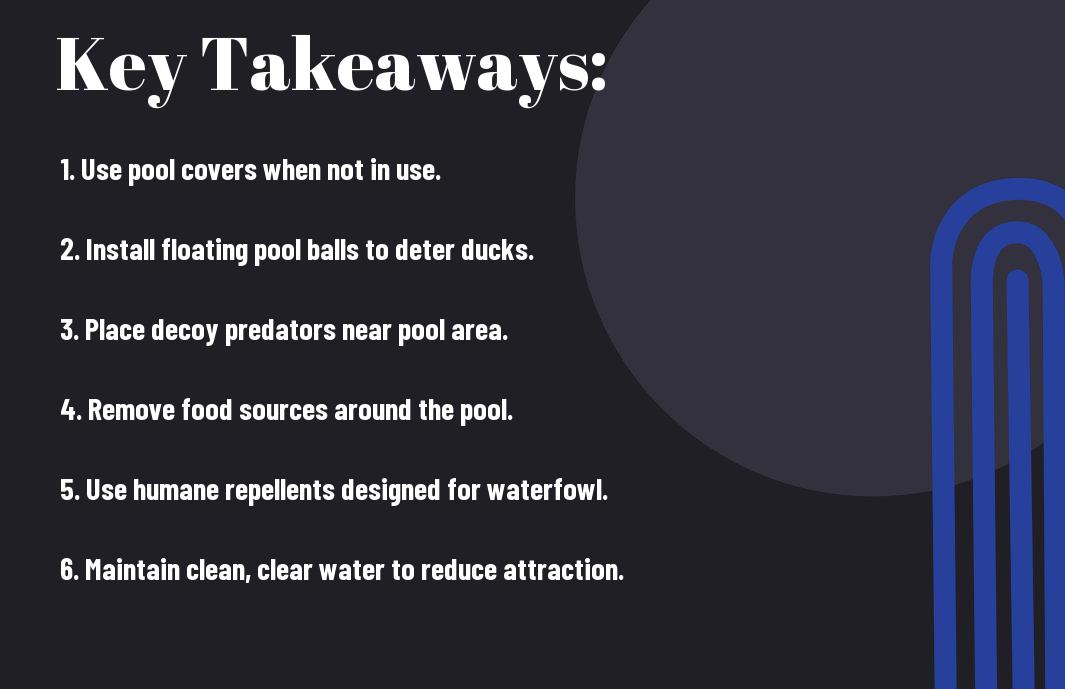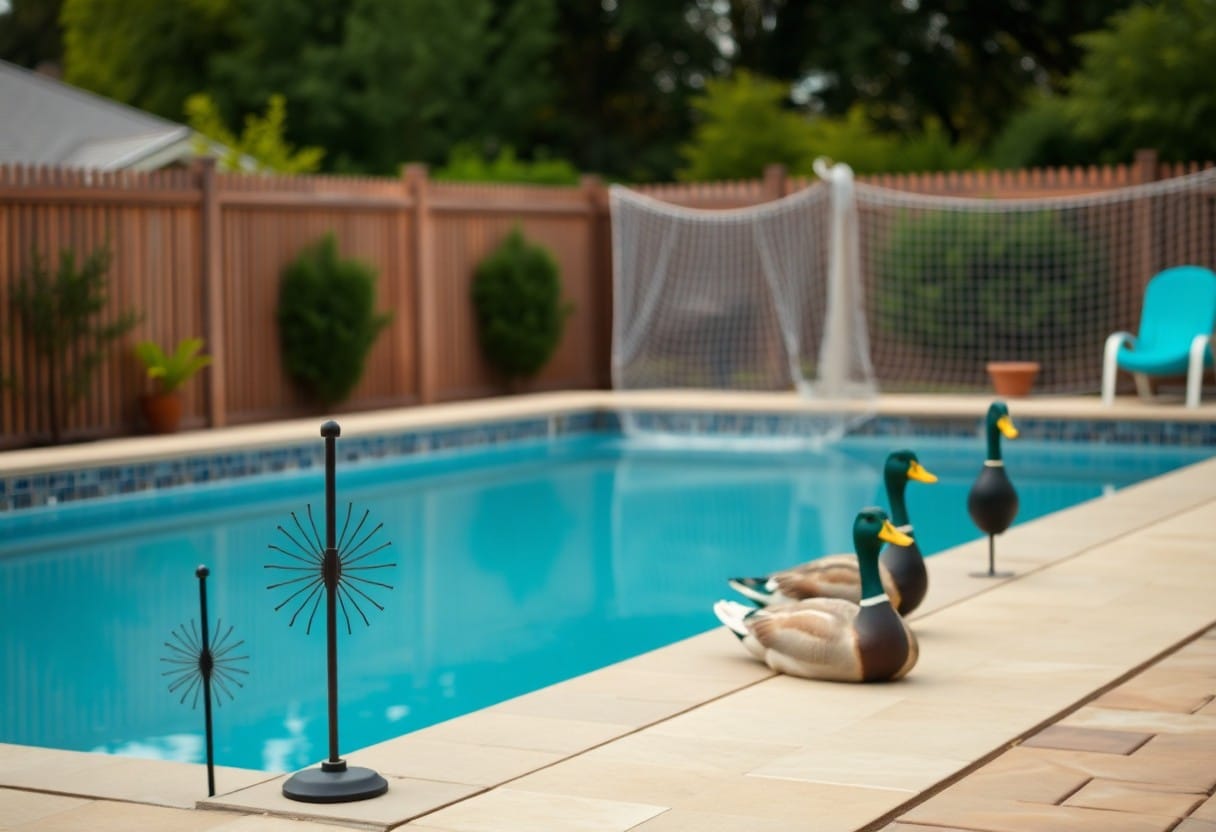Most people love the sight of ducks waddling by, but when they invade your swimming pool, it can lead to unwanted mess and health concerns. If you’re looking for effective strategies to keep these feathered friends at bay, you’ve come to the right place. In this guide, you’ll discover practical tips and solutions to deter ducks from making your pool their new favorite hangout spot. From physical barriers to natural repellents, you’ll learn how to protect your pool and maintain a clean, inviting environment for your family.

Crafting an Unwelcoming Environment
Creating an unwelcoming environment for ducks can effectively deter them from your swimming pool. Adopt measures that make the area less appealing, including both physical obstacles and landscape modifications. These adjustments create barriers that discourage ducks from approaching and nesting, allowing you to enjoy your pool without unexpected visitors.
The Role of Physical Barriers
Physical barriers play a significant role in keeping ducks away. Installing a fence around your pool area can provide a solid deterrent, especially if the fence is at least four feet high. Additionally, netting or mesh can be used over the pool itself when not in use, preventing ducks from landing on the water’s surface.
Utilizing Strategic Landscaping
Strategic landscaping can also be an effective way to keep ducks at bay. By modifying your garden design, you can make it less inviting for both ducks and other birds. Tall grasses and dense shrubs create visual barriers that frustrate ducks’ attempts to access your pool while offering you added privacy.
Incorporating native plants can further discourage ducks, as these are often less attractive to them compared to open, grassy areas. You might consider planting low-growing flowers or ground cover around the pool’s perimeter, as ducks prefer open spaces where they feel safe. Additionally, removing any standing water, such as puddles or ornamental ponds, will eliminate nearby resources that might draw them in. Overall, a well-planned landscape can effectively reduce the likelihood of ducks venturing into your swimming pool area, enhancing both aesthetics and functionality.


Enticing Alternatives: Providing Nearby Habitats
By creating enticing alternatives, you can guide ducks away from your swimming pool and encourage them to settle in designated areas nearby. This not only helps keep your pool cleaner but also provides ducks with a suitable environment to thrive. Incorporating water features and vegetation away from your pool will attract these birds while keeping your swimming area free from their presence.
Creating Designated Water Sources
Establishing designated water sources such as small ponds or decorative birdbaths can effectively draw ducks away from your swimming pool. These alternative water features should be set up further away from your pool, enabling ducks to access a safe and inviting habitat without feeling the need to invade your swimming area.
Planting Duck-Friendly Foods Away from Your Pool
Planting duck-friendly foods nearby creates a natural buffet that diverts their attention from your swimming pool. Opt for plants such as water lilies, wild rice, or other aquatic vegetation that ducks enjoy. By incorporating these edible plants near your designated water sources, you encourage them to forage there instead of venturing to your pool.
Consider incorporating a variety of native plants that ducks naturally eat, such as sedges, cattails, and certain types of grasses. These can provide shelter as well as nourishment, making their new habitat more appealing. Additionally, utilizing native plants helps reduce maintenance and integrates seamlessly into your landscape. Regularly monitoring the health of your planted areas ensures they remain attractive to ducks while keeping your pool area pristine. If you create a lush environment nearby, ducks will be less inclined to frequent your swimming pool, allowing you to enjoy it without any interruptions.
Sound and Visual Deterrents: Keeping Ducks at Bay
Incorporating sound and visual deterrents can significantly enhance your ability to keep ducks away from your swimming pool. These methods leverage the natural aversions of ducks, making your outdoor space less appealing. From using noise-makers to implementing surprising visuals, you can create a less hospitable environment that encourages these birds to seek refuge elsewhere.
The Science of Sound Deterrents
Sound deterrents work by employing high-frequency noises or startling sounds that ducks find uncomfortable and intrusive. Devices like ultrasonic repellents emit frequencies beyond human hearing but are disturbing enough for ducks. Studies show these sounds can prompt ducks to alter their behavior, making them less likely to venture into your space. Experimenting with various noise levels and types can maximize effectiveness in deterring these feathered visitors.
Visual Scare Tactics That Work
Visual scare tactics utilize items that create a sense of danger or discomfort for ducks. Common options include reflective surfaces, predator decoys, and even simple items like plastic owls or brightly colored flags. Studies demonstrate that fluctuations in light and movement can significantly decrease the frequency of duck visits as these birds often avoid areas that seem unsettling or hostile.
Within visual scare tactics, employing moving objects offers added advantages. Items like wind-spinners or hanging iridescent tape can create shifting reflections that confuse ducks, while the mere presence of an inflatable alligator or a lifelike owl can suggest the threat of predation. Placing these deterrents strategically around your pool area enhances their effectiveness, ensuring ducks stay clear of your swimming oasis. Consider experimenting with combinations to find the most effective setup for your backyard.
Behavioral Insights: Understanding Duck Habits
Gaining insight into duck behavior helps you devise effective prevention strategies. Ducks are social creatures, often drawn to groups and familiar environments. They seek water sources for feeding and resting, which explains why your pool may appear inviting. By understanding these habits, you can take targeted measures to disrupt their routines and reduce visits. Awareness of their patterns will allow you to act proactively and maintain a duck-free swimming area.
The Seasonal Patterns of Duck Migration
Ducks follow predictable migration patterns, relying on seasonal changes to guide their movements. During spring and fall, many species travel thousands of miles between nesting and wintering grounds. In warmer months, you may notice a spike in duck activity as they seek out reliable water sources, like your pool. Recognizing these patterns enables you to prepare your space ahead of significant migrations, ensuring your pool remains duck-free.
Recognizing Attraction Triggers
Understanding what specifically attracts ducks to your pool can significantly enhance your prevention efforts. Ducks are likely drawn to the still water, reflecting the sky above, which can mimic natural habitats. Additionally, if your pool area is near food sources, such as seed-bearing plants or open trash, it becomes even more appealing. Addressing these triggers can lessen the chances of ducks considering your pool as their next stop.
By recognizing these attraction triggers, you can implement practical solutions. For example, regularly clean up any spilled birdseed or remove nearby food sources that might entice ducks. Also, consider investing in pool covers or installing netting when not in use. Modifying the pool’s appearance can make it less attractive, such as adding floating pool toys or inflating beach balls that disrupt the water’s reflection. These small changes can serve to discourage ducks while maintaining an enjoyable swimming environment for you.
Collaborative Solutions: Engaging the Community
Engaging your community can amplify your efforts to keep ducks away from your swimming pool. By collaborating with neighbors and local wildlife services, you can implement effective strategies that benefit everyone involved. Shared concerns about waterfowl can lead to community-wide initiatives, creating a more robust deterrent system not just for your property, but for surrounding areas as well. Together, you can share resources, insights, and solutions that will help maintain a duck-free environment for pools and similar water features.
Working with Neighbors for Effective Strategies
Teaming up with your neighbors allows you to develop collective approaches to deter ducks. Discussing strategies such as installing fences, sharing noise-making devices, or planting less enticing landscaping can create a united front. Community gatherings or digital group chats can serve as platforms to brainstorm ideas and monitor each other’s ponds for any returning duck visitors.
Leveraging Local Wildlife Services
Connecting with local wildlife services can provide you with additional expertise and resources tailored to your area. These services often monitor local duck populations and can offer valuable advice on humane deterrent methods. Investigate whether your community has wildlife experts who can assess your yard, suggest habitat modifications, or even help organize educational workshops on the importance of coexisting with local wildlife while keeping pools safe.
Many local wildlife services also have relationships with licensed duck control professionals who can assist in implementing solutions. By utilizing their resources, you may gain access to insights that can be specific to the species in your area. For instance, they may recommend effective deterrent products that other community members have successfully used. Having a local expert assess your situation can lead to better-tailored strategies, making your efforts much more effective against ducks while still respecting local ecosystems.
Conclusion
Following this guide, you can effectively keep ducks away from your swimming pool by implementing a variety of strategies. Utilize physical barriers, sound deterrents, and scent repellents to create an environment that discourages these birds from frequenting your pool area. Additionally, maintaining clean surroundings and removing food sources will help dissuade them from returning. By taking these proactive steps, you can enjoy your pool without the unwanted company of ducks.
